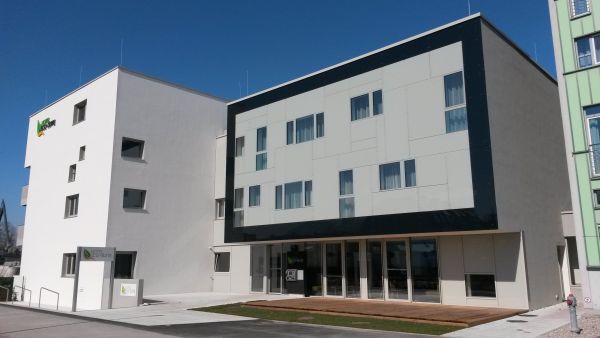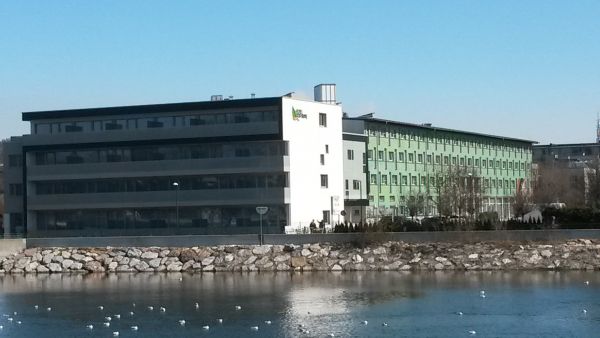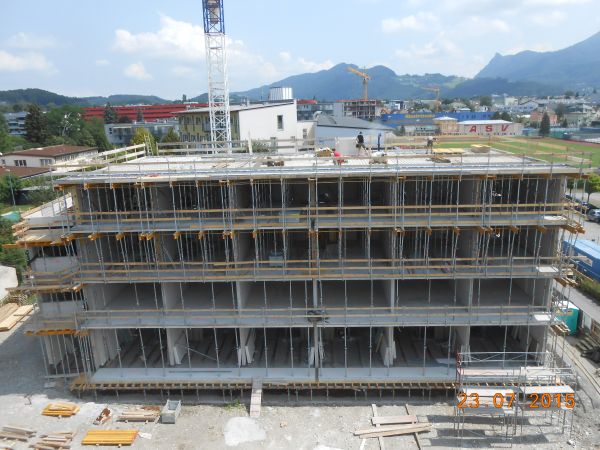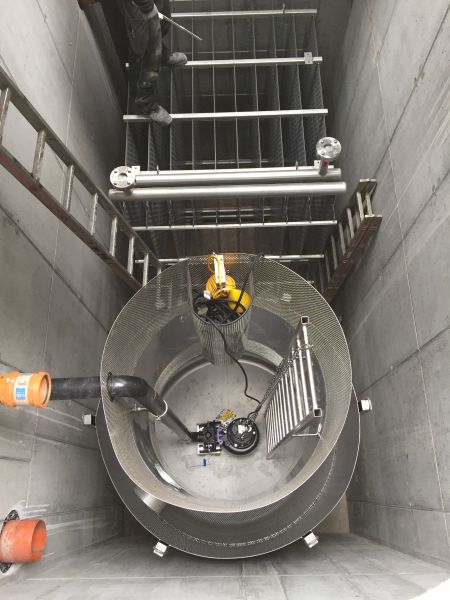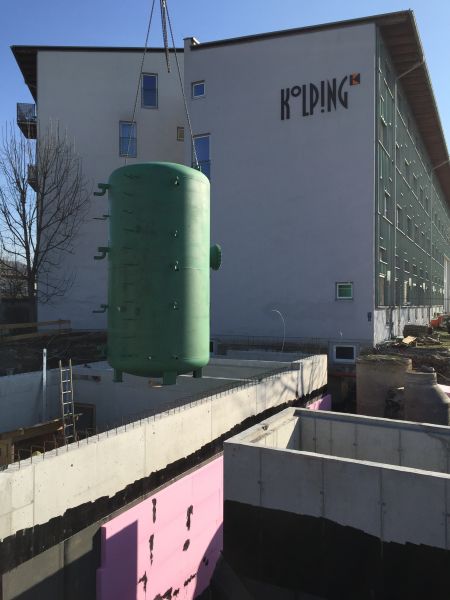Energy package Kolpinghaus / Eco-Suite Hotel
Short Description
Status
completed
Summary
Starting point/Motivation
The "Kolpinghaus" owned by the Kolpingsfamilie Salzburg-Zentral is located in the city of Salzburg, Adolf-Kolping-Straße 10. It is being operated as a youth hostel during the school year and as a summer hotel during the school holidays, respectively. Due to the increasing demand for hotel rooms and as a supplementary offer in context with offering rooms for seminars the decision was taken to construct a new building with 44 hotel rooms. For the newly constructed building sustainability and energy efficiency were chosen as crucial targets.
Contents and Objectives
The overall goal of this project was the extension of the “Kolpinghaus”aiming at plus energy quality. The following project targets were crucial:
- Minimization of energy demand for electricity as well as for heating;
- Use of local available energy sources;
- Integration of the building in a local energy system to be developed within the project.
A building in plus energy quality requires highly efficient components (e.g. LED lighting) as well as active components for using local energy sources like e.g. waste water heat recovery and photovoltaics. In context with the integration of the building in a local energy system suitable solutions for the use of plus energy being generated within the building have to be identified and developed. The monitoring as well as the optimization of the operation of the plus energy system was of special interest in context with this project.
Methods
In work package 1 (WP 1) relevant issues in context with the energy concept for the building were analysed. It was also investigated how to develop further the whole building complex (including the existing building) towards plus energy quality. In this context a plan for the stepwise realisation was developed as well. In WP 2 the planning process was finalized and documented. Within WP 3 the new part of the building was constructed. WP 4 comprised monitoring, measurements and quality control, WP 5 various dissemination activities and WP 6 project management tasks, respectively.
Results
Details in context with the plus energy concept for the new part of the building were analysed and suitable solutions were identified. As a result waste water heat recovery is a crucial element of the energy concept as well as photovoltaics.
A stepwise plan for the realization of the plus energy system for the building as a whole was developed including the respective time scale. Within the planning process the construction phase had been prepared. At the beginning of the construction phase dissemination activities and monitoring had been started as well. A total quality building planning document is available as well as the respective certificate for the building constructed. The recording of the monitoring data was continued beyond the end of the funding period.
The monitoring results show good up to very good values for the first months of operation with regard to the air quality of the investigated rooms. While the indoor temperature drops below the lower comfort limit (20° C) at only one percent of the hourly values, need for action has been identified in context with summer overheating and efficiency of the heat pump system. The electricity generated by the PV system is in the expected range.
Prospects
The energy concept being developed within this project can be of interest for comparable buildings. The same will be true for the considerations in context with the creation of the local energy system and for experiences in context with the optimization of the operation of the building and the energy system, respectively.
With regard to the use of the heat contained in the wastewater, a small part of the existing potential has been realized so far - especially in the area of the hotel industry, it seems promising to consider this heat supply alternative. The use of a waste water heat recovery system is basically useful for projects where there is year-long and continuous hot water consumption. Therefore, a pilot project in the municipal housing sector should be implemented in medium term making use of experience from this project. Especially in the municipal housing sector (new as well as existing buildings) an enormous multiplication factor would be given. The use of photovoltaics for covering self-consumption is – depending on irradiation conditions, expenditures in connection with the installations and respective electricity price level - economical.
The guests will profit from the high quality of the building and will be able to experience the quality of a modern and innovative building. Special building visits will be offered for experts.
Project Images
Terms of use: The pictures listed underneath the header “Project Pictures” originate from the projects in the frame of the programmes City of Tomorrow, Building of Tomorrow and the IEA Research Cooperation. They may be used credited for non-commercial purposes under the Creative Commons License Attribution-NonCommercial (CC BY-NC).
Project Partners
Project management
Kolpingsfamilie Salzburg Zentral
Project or cooperation partners
- AEE INTEC
- kofler architects
- bau physik TEAM
- TB Stampfer, Ingenieurbüro für Gebäudetechnik
- Technisches Büro Dieter Hermann
- Energie.Effizienz.Beratung
Contact Address
Robert Freund
Energie.Effizienz.Beratung
Egerlandweg 2
D-83024 Rosenheim
Tel.: +49 (0) 176 430 86 217
Fax: +49 (0) 3222 930 4978
E-Mail: robert-freund@gmx.net

